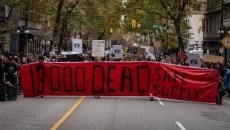Canada is moving to match the United States with new tariffs on electric vehicles made in China in a bid to keep the cars from getting a significant foothold in the North American market.
Prime Minister Justin Trudeau outlined the plan at the federal cabinet retreat in Halifax on Monday, promising to increase import taxes on Chinese-made EVs to 106.1 per cent on Oct. 1, up from 6.1 per cent.
Tariffs on Chinese-made steel and aluminum products will go to 25 per cent on Oct. 15, with a final list of which products will be affected expected Oct. 1.
"We are transforming Canada's automotive sector to be a global leader in building the vehicles of tomorrow, but actors like China have chosen to give themselves an unfair advantage in the global marketplace, compromising the security of our critical industries and displacing dedicated Canadian autos and metal workers," Trudeau said.
"So we're taking action to address that."
The announcement comes nearly four months after U.S. President Joe Biden announced plans to quadruple the import tariff on Chinese-made EVs to 100 per cent in May, citing unfair subsidies from Beijing to Chinese EV makers. The tariffs were to take effect Aug. 1 but have been delayed until September.
The U.S. commerce department is also investigating national security concerns related to internet-connected vehicles from China and other countries.
Finance Minister Chrystia Freeland cited unfair trading practices but also "abysmal" environmental and labour standards that she said allow China to unfairly price and dump products into the market at a huge cost to the environment and workers.
Chinese brands are not a major player in Canada's EV market right now, but imports from China have exploded in the last year after Tesla switched from U.S. factories for its Canadian sales to its manufacturing plant in Shanghai.
Chinese EV giant BYD, which stands for Build Your Dreams, established a Canadian corporate entity last spring and has indicated it intends to try and enter the Canadian market as early as next year.
It has seen exponential growth in Europe, which is also planning new tariffs on electric vehicles made in China.
The tariffs are intended to try and keep that from happening here.
"The reality is China has an intentional state-directed policy of overcapacity and oversupply designed to cripple our own industries," said Finance Minister Chrystia Freeland.
"Talk to the steel sector, talk to the aluminum sector to understand how effective that has already been and we simply will not allow that to happen to our EV sector, which is showing such promise and in which we have invested so effectively."
Canada already has 18 different trade remedies targeting China for unfair trade practices related to steel, but China's exports to Canada of steel products have doubled since 2020.
The Canadian Steel Producers Association was among the industry groups begging Canada to do more in the spring, when Biden announced the U.S. plan.
Catherine Cobden, president of the steel association and Jean Simard, president of the Aluminum Association of Canada, issued a joint statement Monday applauding the new tariffs as "proactive" to protect workers.
"Canada is also taking the important step of aligning with its CUSMA trading partners, protecting fortress North America and refusing to be a point of entry for unfairly traded and high carbon steel and aluminum imports," they said.
That alignment also pleased Brian Kingston, president of the Canadian Vehicle Manufacturers' Association.
"With an upcoming review of the Canada-United States-Mexico Agreement in 2026 there is simply too much at stake for the automotive industry and broader economy if Canada is misaligned," he said.
Conservative Deputy Leader Melissa Lantsman, who also happened to be in Halifax Monday, chided Trudeau for waiting so long to follow the Americans.
"We want to see the best deal for Canadians and we don't want to see our markets flooded with EVs, these subsidizing Chinese-built EVs, instead of putting more money in the pockets of Canadian workers, in Canadian industry," she said. "That is not something we stand for."
She also criticized the Liberals for not going as far as Biden and adding new tariffs on EV batteries, solar cells, semiconductors and critical minerals.
The government said Monday Canada is launching a new round of consultations to possibly add tariffs to those products as well, but it is a slightly trickier equation because unlike electric vehicles, Canada does import those products from China and must tread carefully not to upset the supply chain its own EV industry depends on.
Canada also moved Monday to stop offering the federal rebate, worth up to $5,000, for EVs made in China, implementing a new rule to limit it to vehicles made in countries it has free trade agreements with. That means vehicles made in Korea, Japan and Europe would still qualify but those made in China won't.
The government has already been in talks with Tesla about switching the cars intended for the Canadian market from China to its other plants. Teslas remain the most popular EVs in Canada.
Joanna Kyriazis, director of public affairs at Clean Energy Canada, said Canada went too far with the additional 100 per cent tariff, saying Europe's plan to impose 36.3 per cent in additional tariffs on Chinese-made EVs is more reasonable.
"Unfortunately, Canada made a decision today that will result in fewer affordable electric vehicles for Canadians, less competition, and more climate pollution," she said.
She noted that purchase price has been a main impediment keeping Canadians from switching to EVs and this will take cheaper options out of the equation. Europe, she said, already has 11 models at less than $45,000, while Canada had two -- and one of those was recently discontinued.
About one in four cars in Europe purchased last year were electric, compared with just 12 per cent in Canada.






